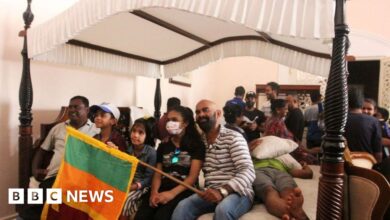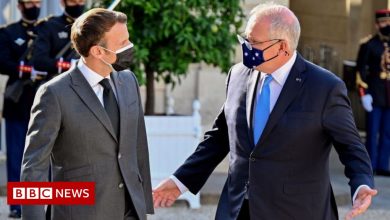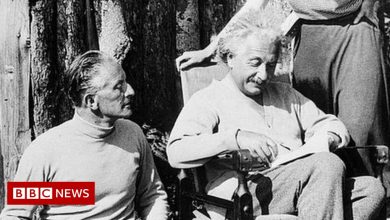What the ANC’s legacy means for South Africa’s past and future
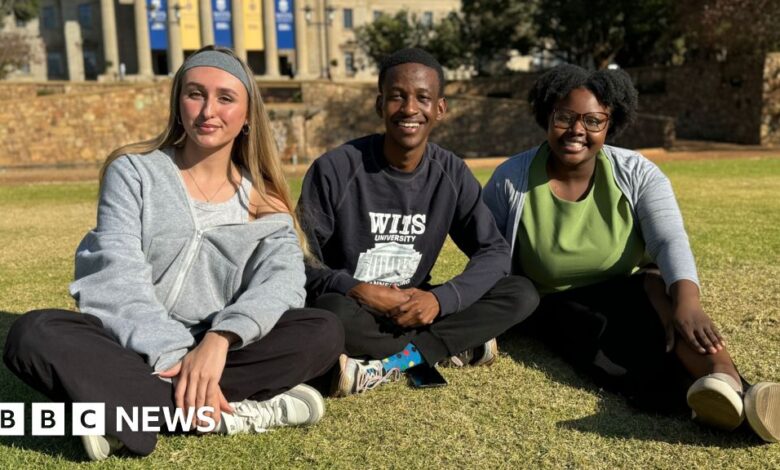
Barbara Plett-Usher,BBC Africa Correspondent
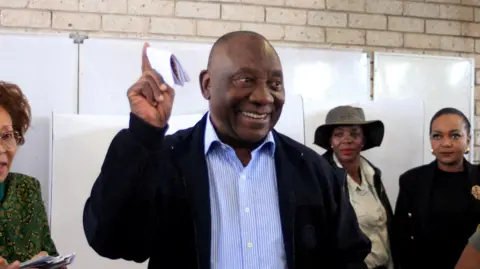 Reuters
ReutersMavuso Msimang read the writing on the wall last year and now South Africans have confirmed what he saw.
The African National Congress (ANC) veteran resigned from the party in December after 66 years, citing widespread corruption and warning that the ANC was on the verge of “losing power”.
The party has lost the unparalleled political power it held since the end of apartheid 30 years ago, with support plummeting.
As South Africans reflect on a pivotal moment in their history, they are looking back at what it meant for the liberation movement of the past and looking forward to what it means for the country’s future .
“I think we can all agree that it’s time for us to make a change,” says Lerato Setsiba, a computer science student at the University of the Witwatersrand in Johannesburg.
“But I think for most people at the moment, we’re pretty scared… we don’t know what’s going to happen.”
Past
Mr Msimang’s home is furnished with tributes to the ANC’s iconic former leader – a life-size painting of Nelson Mandela, a coffee table book bearing his name.
Mr Msimang served in the ANC’s armed wing uMkhonto weSizwe in the 1960s and was appointed to a number of government positions after the 1994 election that brought the movement to power.
He is currently vice president of the ANC veterans federation, which has strongly supported action against corruption within the party’s ranks.
“There is always a tendency not to address issues of accountability, but economic mismanagement has resulted in “a very direct impact on the people,” he said.
“When I see the long lines [of voters] akin to what happened in 1994, I don’t think they are lining up to celebrate the ANC. It was very clear to me that something bad was about to happen.”
“I’m very disappointed,” he told me. “I don’t know how the ANC’s legacy will be reclaimed. I hope this isn’t forever.”
Many older voters who remember the horrors of apartheid remain loyal to that “liberation legacy” – the ANC’s leading role in overthrowing white minority rule.
They also remember the progressive social welfare policies that lifted millions of black families into the middle class and expanded basic services like water, electricity and welfare to millions more.
But the party began to attract people interested in power and political patronage.
Its demise really began under former President Jacob Zuma, who resigned in disgrace amid accusations that he had allowed business partners to infiltrate government ministries. He denied the allegations.
Mr. Zuma was replaced by Cyril Ramaphosa, who was accused of not taking strong enough action to root out corruption in the party.
However, Mr Msimang has not abandoned the ANC. He was persuaded by veteran comrades to rejoin the party.
“I don’t think all is lost. It is time for the ANC to regroup,” Mr Msimang said.
“However, the renewal of the ANC will take the form of ensuring that the truly corrupt elements are removed from the organisation. We really did not act decisively to do that… we did not heed the pleas of the people.”
However, Mr. Msimang worries about the lack of a strong alternative party: “There is this division, which will make the country very unstable if this situation continues.”
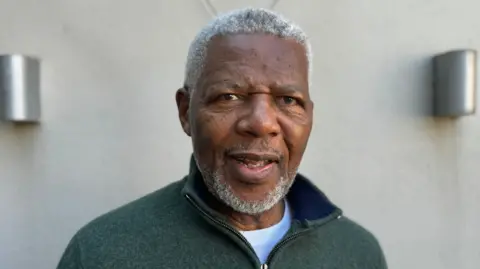 Ed Habershon/BBC
Ed Habershon/BBCPresent
At the election results center near Johannesburg, numbers were highlighted on a control panel that monitored vote counting.
Its giant screen dominated a hall crowded with journalists, party officials and analysts like Susan Booysen. She found a quiet place to talk to me.
The theme was coalition politics, something South Africa has not had at the national level for two decades. Although the ANC remains by far the largest party, it will need to share power to stay in power.
The political landscape is difficult and fraught with consequences because the major parties have different visions for the country.
The pro-business Democratic Alliance is not an easy party to fit into because of its free-market agenda and reputation as the party of white communities and other minorities.
The next two largest parties are on the far left, Mr Zuma’s new uMkhonto weSizwe (MK) – a name taken from the ANC’s paramilitary wing – and the Economic Freedom Fighters (EFF). They talked about taking over white-owned land and nationalizing mines and banks.
The ANC sees the EFF as “too capricious in its direction and too unreasonable in its policy demands,” Ms Booysen said.
And there is too much “bad blood” between the ANC and MK, which has announced it will not cooperate with the ANC as long as Mr. Ramaphosa remains leader of the ANC.
Toppling Mr Ramaphosa is “the main objective of the MK party at this stage and the ANC is the collateral damage in that process as far as they are concerned”, she said.
Mr. Zuma’s return despite presiding over more than a decade of widespread corruption struck a different note. He stormed the convention center Saturday night to make allegations of election fraud.
The outcome of the chaotic coalition talks is expected to decide between two very different paths for South Africa.
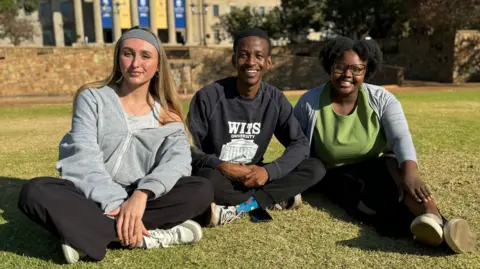 Ed Habershon/BBC
Ed Habershon/BBCFuture
On the Wits University campus in Johannesburg, a group of student actors are performing a parody of the election.
People voted in large numbers here – many of them, like medical student Nobuhle Khumalo, for the first time.
She’s excited about the change but doesn’t know what it means: “We’ll see what it looks like when it happens.”
We were chatting on the patio in front of the library with two of her friends, Mr. Setsiba and music student Silka Graetz.
They hope a coalition government will bring more accountability and transparency, but fear it could lead to greater political unrest and disorder.
“I think increasing the number of votes with other parties will definitely create a healthy competition,” Ms. Graetz said.
“And I think healthy competition will bring better service, just innovation in a lot of different areas.”
Young people, many of whom did not experience apartheid, were more willing than their parents to abandon the ANC, due to concerns about their future.
About 45% of South African youth are unemployed, the highest rate recorded in the world.
“When it’s election time, you don’t talk about issues related to youth,” Mr. Setsiba said, criticizing the government’s cuts in education budgets in recent years.
“Put money into universities, stimulate entrepreneurship and make this country a prosperous nation for new businesses!”
Ms. Graetz warned that it was important to restore investor confidence in the country to improve the economy.
Both she and Mr. Setsiba are preparing to graduate, so entering the job market is the first thing they think about.
Ms. Graetz is acutely aware that her future will be shaped in the next four or five years, the period before the next election.
“One question I have is: ‘How long do we have to wait to see something [change]?'” she said. “I think there’s been a big change in attitudes. How long will it take for that to happen?”
It took 30 years for the ANC to be held accountable for its failures. South Africa’s younger generation is not willing to wait that long.


